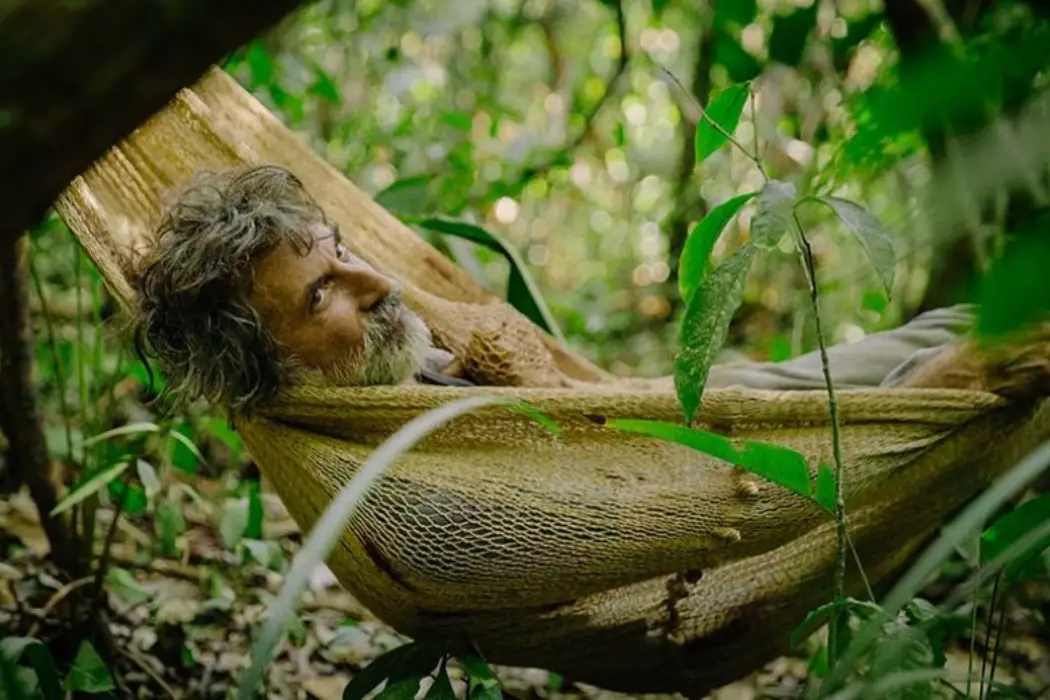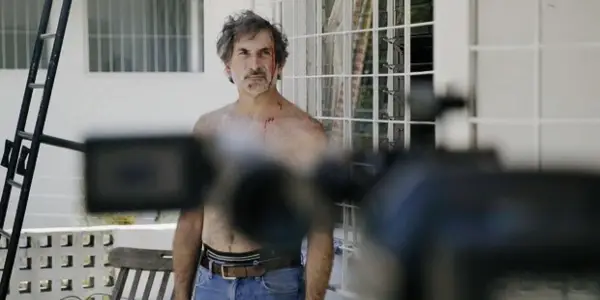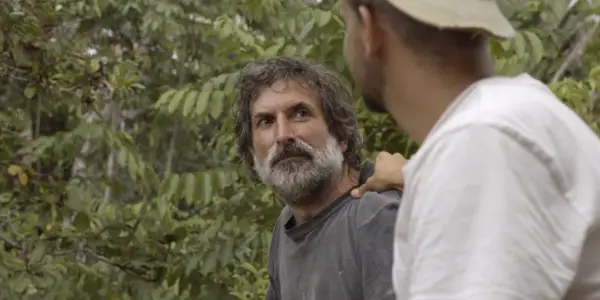EL FATHER PLAYS HIMSELF: A Raw & Vulnerable Documentary That Is Not To Be Missed

Stephanie Archer is 39 year old film fanatic living in…
Biographical fiction can be one of the most fascinating focuses in cinema. A moment to look into the lives of an individual, to further understand the mind and the events surrounding them opening up a new world of information and understanding to viewers. Yet, where biographical fiction has its limitations, documentaries have the deep power to deliver truth and vulnerability.
El Father Plays Himself is a raw look at the fractured relationship of a father and son as they attempt to recreate the past through the mirror and haze of present obstacles and emotions. As they attempt to bring a biographical fiction surrounding father’s life to fruition, director Mo Scarpelli brings to viewers a heartbreaking and engaging look at the process behind the camera. There is a deep vulnerability El Father exudes, one that is sure to fascinate and hypnotize audiences alike.
Capturing Reality
Jorge Thielen Hedderich (father) and Jorge Thielen Armand (son) have embarked on the cinematic journey of filming La Fortaleza, a film surrounding the father’s past with his son in the director’s chair. From the final days of pre-production to a six-week long shoot in the Amazon jungle, reality and fiction begin to blend as filming becomes more real than anyone could have ever anticipated.

While they shape into focus their film, Scarpelli delivers audiences the chance to see the artistic process behind the camera and the true emotional turmoil and strain the filming process places on all involved – especially between father and son. What initially seems like an inspiring match-up quickly degrades and dissolves into years of torment and separation.
Father and Son
When you boil everything down, what viewers are left to understand is that El Father Plays Himself is singularly about the relationship between father and son. While the filmmaking process is being documented, the film is not the focus. This relationship between father and son is captured in every aspect, from sadness to exuberance, from distress to anger – from success to failure.
There are moments captured within El Father Plays Himself that are breathtaking in the strength and power they exude. While much can be attributed to the inescapable beauty of the Amazon and Scarpelli’s eye for scenery and lighting, many of these moments include father and son standing next to one another, awkward and silent. While at first, it may seem it is due to the camera focused on their current mission, viewers will come to understand the vulnerability captured is the inability of communication between these two.
There have been fractures between the two for years that affect their communication. While Father is expressive in his emotions, his son finds comfort in silence, many times only speaking up when completely necessary. These silences are captured as much as the noise, driving home the true relationship they share and the difficulties their current relationship imposes on the film.
The film and its cast are at its most vulnerable when the father is indisposed, his rants and screams piercing the night. The camera becomes a voyeuristic intruder at times, peering through the window blinds, keeping its lenses focused on the pure emotion of all affected by Father’s drinking. It is in these moments you as a viewer will feel you are betraying trust in the raw and vulnerable nature of the film’s subjects, but at the same time commending Scarpelli behind the camera for pushing forward to keep the documentary true to itself, to its audience and to is dedication.
These are some of the most difficult moments in El Father Plays Himself, to see a man stripped away and exposed to the world as he fights his own demons – yet a man who at the same time is good of heart, clearly seen in the wonder in his eyes and the gentle nature with the dog on set. There is a cohesive and complete picture that is painted by allowing not only the demons to show but also the moments of euphoria.

As a viewer, you wonder why the son would take this project on – his entire success balancing on his father. There is a moment within the film where the son and one of his crew members are reviewing the tape from the day’s shoots. There is a question of what will happen if the father sees and disapproves of what was filmed. Will he prevent them from showing the film? Will all this be for nought if the father can not come to terms with what is on camera?
A Question of Morality
Whether intentional or not, El Father Plays Himself brings into question a sense of morality. One of the first times I realized this was the film’s most obvious example. For La Fortaleza, scenes were needed showcasing a moment in Father’s life when he would drunk-dial his son, leaving messages of angst and desire. What became questionable was the son’s belief that the father could not genuinely recreate being drunk – that he would have to actually become intoxicated to succeed.
The film alludes the father has been suffering from alcoholism for some time, much of the beginning of the film showing the son attempting to curb his drinking, limiting what is available and informing the cast to his limits. Yet, for the artistic success of the film, the son is willing to sacrifice any chance of his father’s sobriety. While the son does not allow the father to embark on this push for authenticity alone, accompanying him (even after a failed watered-down attempt), there is a question on whether the success of the scene was worth the sacrifice.
From this moment, I found myself questioning other possible areas of morality throughout El Father Plays Himself. Was it morally responsible for the son to not only recreate his father’s past, which clearly still haunts and affects him, but to further cast him to recreate the role – to become reimmersed in his past self. Would it have been better to build the story from the words, video and images the father could have provided, protecting the father from diving into the past?
Further, when talking about filming, and circling back to the question of him seeing himself on screen, there is a question of whether it was right to capture the process through a secondary lense. Where there was concern of his appearance within the film, this further extends to a greater capacity when you see the vulnerability exuded through each aspect of El Father Plays Himself.
El Father Plays Himself: Conclusion
El Father ends in a seemingly peaceful moment of tranquility, yet as the camera holds onto its subject one last time, there is a sense of relief accompanied by exhaustion. Viewers are left with the silent question: Was it all worth it?
I honestly can not recommend El Father Plays Himself enough. It will burrow deep below your skin, locking you in front of your screen. As the son and father need to see their art through, so too do viewers of this documentary. There is a catharsis that is achieved through witnessing truth, witnessing the process – one that is not easily forgotten.
Have you had the chance to see El Father Plays Himself? What did you think? Let us know in the comments below!
El Father Plays Himself is currently streaming for free (until May 2) here!
Does content like this matter to you?
Become a Member and support film journalism. Unlock access to all of Film Inquiry`s great articles. Join a community of like-minded readers who are passionate about cinema - get access to our private members Network, give back to independent filmmakers, and more.













